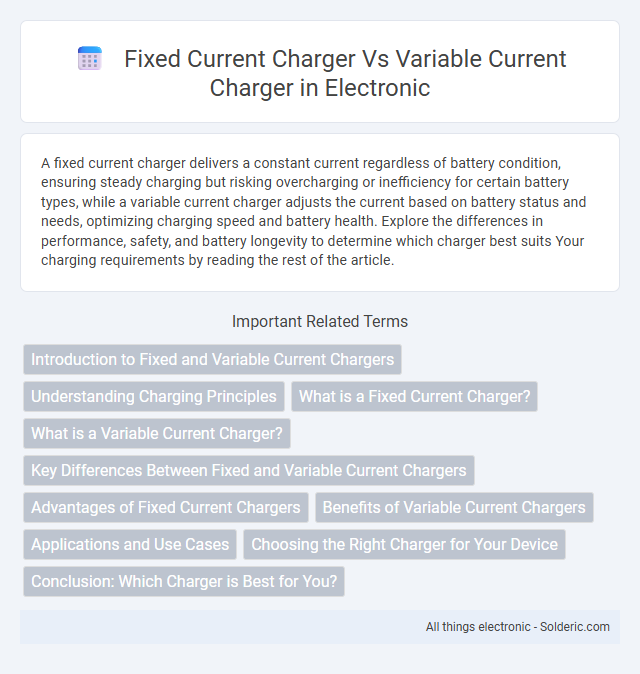A fixed current charger delivers a constant current regardless of battery condition, ensuring steady charging but risking overcharging or inefficiency for certain battery types, while a variable current charger adjusts the current based on battery status and needs, optimizing charging speed and battery health. Explore the differences in performance, safety, and battery longevity to determine which charger best suits Your charging requirements by reading the rest of the article.
Comparison Table
| Feature | Fixed Current Charger | Variable Current Charger |
|---|---|---|
| Current Output | Constant, predefined current | Adjustable current based on need |
| Charging Flexibility | Low - fixed rate | High - adapts to battery status |
| Battery Compatibility | Limited to specific types | Supports multiple battery chemistries |
| Efficiency | Lower - may overcharge or undercharge | Higher - optimizes charging cycle |
| Cost | Lower initial cost | Higher initial cost |
| Use Case | Simple devices with standard batteries | Advanced devices requiring precise control |
Introduction to Fixed and Variable Current Chargers
Fixed current chargers deliver a consistent, predetermined current throughout the charging cycle, ideal for applications requiring stable and predictable power supply. Variable current chargers adjust the current dynamically based on battery voltage, temperature, or charge stage, enhancing efficiency and battery lifespan. Understanding the distinction helps in selecting the appropriate charger for specific battery types and usage scenarios.
Understanding Charging Principles
Fixed current chargers deliver a consistent and predetermined current throughout the charging process, ensuring stable and predictable energy flow ideal for batteries with specific charging requirements. Variable current chargers adjust the charging current dynamically based on battery voltage, temperature, and state of charge, optimizing battery health and efficiency by preventing overcharging and heat buildup. Understanding these charging principles is crucial for selecting the appropriate charger type to maximize battery lifespan and performance in diverse applications.
What is a Fixed Current Charger?
A Fixed Current Charger delivers a constant current output regardless of battery voltage or state of charge, ensuring steady and predictable charging. This type of charger is ideal for applications where consistent current is necessary to avoid overcharging or overheating, typically used in lead-acid battery systems. Your choice of a fixed current charger can simplify the charging process but may lack the flexibility needed for batteries requiring variable charging profiles.
What is a Variable Current Charger?
A Variable Current Charger allows you to adjust the charging current according to the battery's requirements, optimizing charging speed and efficiency. Unlike Fixed Current Chargers that deliver a constant current regardless of battery condition, variable chargers adapt to different battery types and states of charge. This flexibility extends battery life and enhances safety by preventing overcharging and overheating.
Key Differences Between Fixed and Variable Current Chargers
Fixed current chargers supply a constant current throughout the charging process, ensuring a steady and predictable charge rate suitable for batteries requiring uniform charging conditions. Variable current chargers adjust the current dynamically based on the battery's state, temperature, and voltage, optimizing charging efficiency and battery lifespan by reducing current as the battery approaches full charge. These differences make fixed chargers ideal for simple, cost-effective applications, while variable chargers are preferred for advanced battery management systems requiring smart and adaptive charging.
Advantages of Fixed Current Chargers
Fixed current chargers provide a consistent and reliable charging rate, ensuring battery protection and extending overall battery lifespan. Their simplicity in design reduces the risk of malfunctions, making them cost-effective and easy to maintain. These chargers are ideal for devices with specific charging requirements, offering optimal performance without the need for complex adjustments.
Benefits of Variable Current Chargers
Variable current chargers offer enhanced control by adjusting the charging current to match battery conditions, which extends battery lifespan and improves efficiency. They reduce overheating and energy waste by dynamically optimizing the current flow based on real-time battery status. This adaptability enhances safety and supports faster, more reliable charging across different battery types and states of charge.
Applications and Use Cases
Fixed current chargers are commonly used in applications where a consistent and steady charging rate is essential, such as in small electronic devices, emergency backup batteries, and basic power tools. Variable current chargers adapt charging rates dynamically, making them ideal for complex battery systems like electric vehicles, solar energy storage, and industrial machinery that require optimized charging for battery health and efficiency. Your choice depends on whether you prioritize simplicity and cost-effectiveness or advanced battery management and prolonged battery lifespan.
Choosing the Right Charger for Your Device
Fixed current chargers provide a consistent and stable current ideal for devices with specific power requirements, ensuring safe and reliable charging. Variable current chargers adjust the current based on the device's needs, offering flexibility and protection against overcharging for various gadgets. Understanding your device's charging specifications helps you select the right charger that maximizes battery life and charging efficiency, protecting Your investment.
Conclusion: Which Charger is Best for You?
A fixed current charger delivers a constant charging rate, making it ideal for devices with stable battery specifications and straightforward charging needs. Variable current chargers adjust the charging current based on battery condition and temperature, offering greater efficiency and battery health preservation for advanced or sensitive devices. Choosing the best charger depends on your device compatibility and long-term battery care priorities, with variable current chargers generally providing more versatile and safer charging solutions.
Fixed current charger vs Variable current charger Infographic

 solderic.com
solderic.com